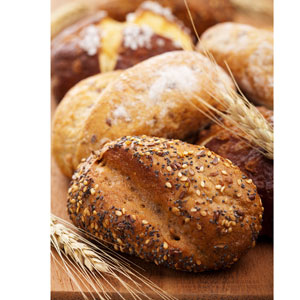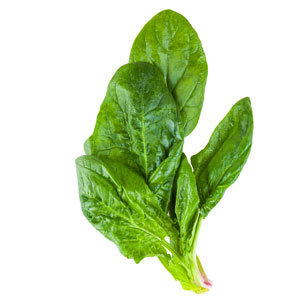The Top 10 Nutrients for Pregnant Women
 Unfortunately, pregnancy doesn’t mean an eating free-for-all. Photo via Shutterstock
Unfortunately, pregnancy doesn’t mean an eating free-for-all. Photo via Shutterstock
You’ve heard the expression that pregnant women are “eating for two,” but dramatically increasing your food intake isn’t as harmless as it may seem. Too many calories can lead to excessive weight gain, gestational diabetes, or hypertension, all of which have negative effects on you and your baby. In fact, your caloric intake shouldn’t change at all until the second and third trimesters, when it should be raised by 340 and 450 calories per day, respectively, which puts most women within the range of 2,200 to 2,900 calories per day.
Along with monitoring calories, pregnant women need to be aware of which nutrients they’re eating. While your health care provider can give you an idea of your body’s specific needs, we’ve compiled a list of what to eat when you’re expecting based on the Dietary Reference Intakes (DRIs), Recommended Dietary Allowances (RDAs), and Adequate Intakes (AIs) for pregnancy.
Carbohydrates
Why: Your energy and your baby’s energy come from carbohydrates, so the majority of the calories you’re consuming—between 45 and 65 percent, at least 175 grams— should be carb-based.
How: Skip the white bread and pasta and instead choose nutrient-dense foods like fruits, vegetables, beans (legumes), and whole grains.
Snack idea: 1 baked potato with skin, topped with ½ cup each of broccoli and cauliflower, and 1 ounce of low-fat cheese.
Protein
Why: Protein makes up the majority of the structural component of both you and your baby’s cells. Protein is also critical for changes in your own body, particularly forming the placenta. The average woman needs about 46 grams of protein per day, while pregnant women need about 71 grams.
How: No need to resort to protein shakes or bars. Just 3.5 ounces of chicken (a piece about the size of a deck of cards) has 30 grams of protein. Beans, low-fat yogurt, salmon, and pasteurized cheeses are also good sources.
Snack idea: Smoothie made with 6 ounces of low-fat greek yogurt, ½ cup low-fat milk or milk substitute (soy, almond, coconut, etc.), 1 banana, 1 tablespoon peanut butter.
Fat (particularly DHA)
Why: The overall amount of fat you should be eating does not change much during pregnancy, but it is important to make sure that you are getting plenty of omega-6 fatty acids (13 grams per day) and omega-3 fatty acids (1.4 grams per day). DHA, a nutrient found in fish, is one form of omega-3s that is especially important for your baby’s brain and eye development and function.
How: Eat 8-12 ounces of fish per week but avoid fish that are particularly high in mercury.
Meal idea: 6 ounce salmon filet, which contains omega-3s but is low-mercury, with spinach sautéed in olive oil (for omega-6s) and garlic and whole grain rice pilaf.
Iron
Why: In 2011, Mass. women were just above the national average for anemia during their third trimester. Women need more iron when expecting (18-27 milligrams daily) because pregnancy increases blood volume around 50 percent, and the hemoglobin in blood needs iron to deliver oxygen to the body, including to the placenta.
How: Your physician may prescribe prenatal vitamins or an iron supplement. You should consume iron-rich foods like lean meat, poultry, beans, eggs, iron-fortified grain products like cereal, and green, leafy vegetables every day.
Snack idea: Omelette made with whole eggs (include the yolk!), with spinach and chopped veggies.
Folate and other B Vitamins
Why: B vitamins are needed for energy production as well as for preventing neural tube defects.
How: By consuming an extra 340 to 450 extra calories per day, you will likely already get the extra B-vitamins you need, including those needed to use the extra energy from food (niacin, thiamin, and riboflavin). Eating a variety of whole grains, fruits and vegetables, legumes, and meat will help you get what you need. The big one to pay attention to is folate and folic acid, which is the B-vitamin that prevents neural tube defects. Folate is found naturally in foods like spinach, lentils, white beans, and broccoli, while its synthetic partner, folic acid, is added to enriched grains. You need about 600 micrograms per day during pregnancy.
Snack idea: 1 cup whole grain cereal, 1 cup low-fat milk or milk substitute, topped with berries.
Vitamin D
Why: Vitamin D promotes calcium absorption, which helps build your baby’s bones while preserving your own. Maintaining normal levels of vitamin D during pregnancy also helps prevent preeclampsia, a condition of pregnancy that includes dangerously high blood pressure.
How: Few foods naturally supply vitamin D, but certain fortified foods, including milk, yogurt, and 100 percent orange juice can help you get in what you need, about 15 micrograms per day.
Snack idea: Fortified yogurt topped with fortified whole grain cereal and fruit.
Vitamin A
Why: Vitamin A is necessary for your baby’s growth at a cellular level. It is also important for vision and immunity.
How: Pregnant women need about 700-800 micrograms of vitamin A daily, which can be achieved by eating vitamin A-rich foods like sweet potatoes, carrots, spinach, cantaloupe, fortified breakfast cereals, fortified milk, and eggs.
Snack idea: 1 sweet potato with skin, sliced, sprinkled with cinnamon, salt, and pepper and baked to make baked “fries”.
Vitamin C
Why: Vitamin C is best known for helping to prevent illness, but it also keeps blood vessels strong and resilient, promotes healthy red blood cells, and strengthens teeth, bones, and connective tissue. It also improves the absorption of the key pregnancy nutrient, iron.
How: Pregnant women need between 80-85 mg of vitamin C a day. The good news is that this nutrient is very easy to get. Just 8 ounces of orange juice contains 124 mg of vitamin C, and 1 cup of chopped red bell pepper has a whopping 283 mg of vitamin C.
Snack idea: Sliced red bell pepper with hummus.
Choline
Why: Choline is important to the development of your baby’s nervous system.
How: Choline is most concentrated in eggs, liver, pork, and beef. Pregnant women need about 450 mg of choline per day; 2 eggs (with the yolk) will supply more than half of the choline you need daily.
Meal idea: Spinach salad with 2 hard boiled eggs, mixed vegetables, and nuts or beans tossed with oil and vinegar.
Zinc
Why: Zinc is an all-around important nutrient. It helps your body produce DNA, which is the blueprint for every cell in your body. It also is important for brain development and blood sugar regulation.
How: Omnivorous pregnant women need nine to 10 milligrams of zinc a day, while vegetarian women may need twice as much because of certain elements in food that impair zinc uptake by the body. Whole grains like brown rice, white beans, oysters, beef, crab, turkey, pork, and yogurt all contain zinc.
Meal idea: Stir-fry lean pork with mixed vegetables and brown rice.












